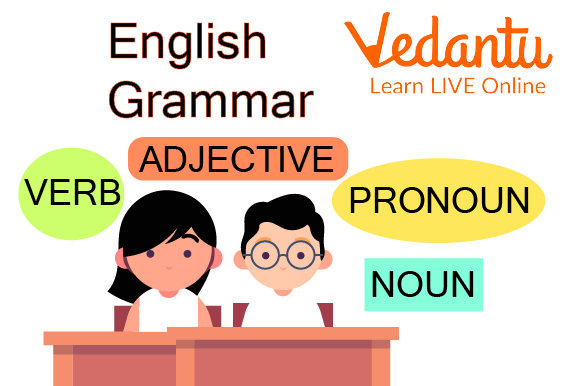




Essential Grammar Topics for Class 8 with Answers and Worksheets
Due to its universality, English can facilitate communication and connections between people all over the world. Therefore, learning the English language is made compulsory in almost all the schools for every class. Subjects in class eight lay the foundation for learning more complicated ideas in higher grades. The majority of class 8 subjects are taught in English. As a result, studying English is crucial both academically and as a communication tool. Students studying for their Class 8 exams must be familiar with the Class 8 English Syllabus to score good marks in this subject.

Introduction to Class 8 English Grammar
Prose, poetry, grammar, and composition are all covered in the Class 8 curriculum. For Class 8 students, English is a high-scoring subject if they are well-aware of all the basic concepts and practice the exercises regularly. We have also provided Class 8 English Grammar topics on this page. Have a look at these topics and prepare accordingly. You can also download English Grammar pdf from the download link provided on this page.
Basics of Class 8 English Grammar
The use of English language requires a set of rules and regulations known as English grammar. These rules are necessary to ensure the use of English language in a more accurate manner.
One must first understand a few of the basic rules of English language if he or she is just beginning to learn English. Learning basic English grammar properly will not only help you construct your sentences correctly, but it will also make it simpler for you to advance your spoken and written English communication abilities.

Basic English Grammar
Easy Tips to Learn English Grammar
Scoring a good marks in English Grammar is very easy if we follow some smart preparation tips and techniques. Students who are preparing for their Class 8 English exam must go through the preparation tips that we have provided here to help you learn English Grammar easily.

Learn English Grammar
Following are some of the ways to learn English grammar -
Make A Commitment
Studying English grammar requires a lot of motivation. Once you are prepared to start studying, persevere through it to the end.
Keep A Grammatical Reference Handy.
By keeping an English grammar book, you can review the material you have learned in class and be compelled to review grammar as frequently as you can.
Daily Practice
Solving as many exercises as you can is one of the finest strategies to improve your language. Solve several practice questions and examples to write sentences or paragraphs will full accuracy.
Keep Reading in English
Look for books, articles, or pieces in the newspaper that are appropriate for your level of English.
English Listening
You'll be surprised at how much you can improve your English vocabulary by listening to various English talk shows, audios or even conversations.
Make an Effort To Converse With Your Teacher and Friends in English.
You would start understanding grammar more clearly if you practise conversational English with your teacher and students more frequently.
Increase Your English Writing
Writing exercises and writing for pleasure outside of class are both important for improving your English grammar.
Recognize the Reason Behind A Grammar Rule
Every grammatical rule has a reason for being used in a sentence. Write down all the rules you were not aware of, then consider why a certain word or statement was chosen. Once you understand it properly, you would never repeat that error.
Request More Assistance From Your Teacher
They can assist you in developing your revision techniques and in identifying places you can improve.
English Grammar Topics
To help you out with English Grammar preparation, we have compiled the list of topics that are covered under Class 8 English grammar.

English Grammar Books
Following are the English Grammar Topics for class 8-
Noun
Pronoun
Verb
Adverb
Prepositions
Phrases and Idioms
Vocabulary
Comprehension Reading
Summary
English is an important subject for every student. In daily life, it serves as a way of communication. Grammar, prose, and poetry are all covered in the class 8 English curriculum. We hope this article helped you in understanding the important topics that are included in Class 8 English Grammar.
Students should practice from the Class 8 English grammar book if they want to have a strong grasp of the language. One may write sentences and paragraphs regularly to make sure they are accurate and devoid of errors. The Class 8 English Grammar pdf includes chapter-by-chapter solutions and several practice questions to help you understand the topics better.
FAQs on Class 8 English Grammar: Master Key Rules & Practical Examples
1. What are the main grammar topics covered in the CBSE Class 8 English syllabus for 2025-26?
The CBSE Class 8 English Grammar syllabus for the academic year 2025-26 focuses on building a strong foundation in sentence structure and correct usage. The key topics include:
- Tenses: Understanding and applying different verb tenses correctly.
- Modals: Using auxiliary verbs like can, could, may, might, will, would, shall, should, and must.
- Voice: Differentiating between Active and Passive Voice and transforming sentences.
- Subject-Verb Concord: Ensuring the verb agrees with its subject in number and person.
- Reported Speech: Converting direct speech into indirect speech, including statements, questions, and commands.
- Clauses: Identifying and using Noun, Adverb, and Relative clauses.
- Determiners: Correctly using articles, demonstratives, possessives, and quantifiers.
- Prepositions: Understanding the use of prepositions of time, place, and direction.
2. What are the eight parts of speech, and what is the function of each?
The eight parts of speech are the fundamental building blocks of English grammar. Each category has a specific role in forming a sentence:
- Noun: Names a person, place, thing, or idea (e.g., Rohan, city, pen, happiness).
- Pronoun: Replaces a noun to avoid repetition (e.g., he, it, they).
- Verb: Expresses an action or a state of being (e.g., run, is, feels).
- Adjective: Describes or modifies a noun or pronoun (e.g., happy, tall, red).
- Adverb: Modifies a verb, adjective, or another adverb (e.g., quickly, very, well).
- Preposition: Shows the relationship between a noun and another word in the sentence (e.g., in, on, under).
- Conjunction: Joins words, phrases, or clauses (e.g., and, but, because).
- Interjection: Expresses a strong, sudden emotion (e.g., Wow!, Oops!, Hurray!).
3. What is the difference between the Active and Passive Voice? Please provide an example.
The main difference between Active and Passive Voice is the focus of the sentence. In the Active Voice, the subject performs the action, making the sentence direct and strong. In the Passive Voice, the subject receives the action, which often shifts the emphasis to the action or the object.
- Active Voice Example: "The teacher taught the lesson." (The subject 'teacher' is performing the action 'taught').
- Passive Voice Example: "The lesson was taught by the teacher." (The subject 'lesson' is receiving the action).
4. Why is understanding Subject-Verb Concord so important for writing correct English sentences?
Understanding Subject-Verb Concord is crucial because it ensures that a sentence is grammatically logical and reads smoothly. When the subject and verb do not agree (e.g., "The students is reading"), the sentence becomes structurally incorrect, which can confuse the reader and make the writing seem unprofessional. Mastering this rule is essential for clear communication as it forms the backbone of a valid sentence, preventing basic errors and improving the overall quality of writing.
5. What are Modals, and what is their main function in a sentence?
Modals, or modal auxiliary verbs, are special verbs that express concepts such as ability, possibility, permission, or obligation. They are used with a main verb to add a specific shade of meaning to it. Their main function is to indicate the mood or attitude of the speaker.
- Ability: She can solve the problem.
- Permission: May I come in?
- Obligation: You must finish your work.
- Possibility: It might rain later.
Unlike regular verbs, modals do not change their form based on the subject's number or person.
6. How do Tenses help a writer show the timing of events in a story or description?
Tenses are a writer's primary tool for controlling the timeline of a narrative. By using different tenses, a writer can precisely place events in time for the reader:
- The Past Tense (e.g., "he walked") is used to narrate events that have already happened, which is the most common tense for storytelling.
- The Present Tense (e.g., "he walks") creates a sense of immediacy, making the action feel like it is happening right now.
- The Future Tense (e.g., "he will walk") is used to describe events that have not yet occurred or to make predictions.
Consistent use of the correct tense is vital for creating a clear and logical sequence of events that the reader can easily follow.
7. What is the main difference between a phrase and a clause, and why is this concept important?
The primary difference between a phrase and a clause is the presence of a subject-verb pair.
- A phrase is a group of related words that lacks a subject-verb combination. It acts as a single part of speech. For example, "in the garden" is a prepositional phrase.
- A clause is a group of words that contains both a subject and a verb. For example, "the sun shines" is an independent clause.
This distinction is important because clauses are the fundamental units for building sentences. Understanding how to combine clauses allows a student to move from writing simple sentences to constructing more complex and sophisticated ones.
8. What are Determiners and what are some common types for Class 8?
A Determiner is a word that comes before a noun to introduce it and provide more information, such as quantity or specificity. They clarify what the noun is referring to. Common types studied in Class 8 include:
- Articles: Definite (the) and Indefinite (a, an). Example: "The dog chased a cat."
- Demonstratives: Words that point to specific nouns (this, that, these, those). Example: "I want those books."
- Possessives: Words that indicate ownership (my, your, his, her, our, their). Example: "That is my school."
- Quantifiers: Words that specify quantity or amount (some, any, many, few, little). Example: "She has some friends."















